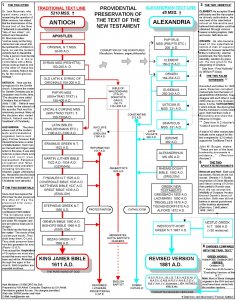Which Bible Version is closest to the original Hebrew and Greek Texts?
Taking the question literally, the version that is closest to the original would be a Hebrew/Greek interlinear Bible. In an English translation, the Hebrew and Greek words appear above the English words. However, this results in awkwardly broken English, which is why we have so many translations to make sense of it. Also, there are no "original" Greek Texts. There are copies of copies of the original texts, most notably are the Majority Text, the Critical Text, and the Received Text. The arguments for or against which of these Texts are the actual words written by the Apostles or their scribes will make you pull your hair out if you choose to search online for which is most reliable. What is amazing in the thousands of full and fragmented pieces of scripture that have been collected is that about 98% of all of these pieces are identical even though they have been re-written by hand for centuries. And, many if not most of the differences are typographical errors such as punctuation marks that do not change the meaning of the words. Some texts have additional verses which do not show up in the other texts. The KJV was based upon the Received Text (Textus Receptus). Most modern Bible versions are based upon the Critical Text, and many include footnotes regarding differences in versions or bracket verses that are included in the Received Text but is omitted in the Critical Text. The NASB has been known to be one of the closest in wording to the Greek and Hebrew translations into English, because they included less paraphrasing and less adjectives in describing phrases. This may be more helpful for biblical students that desire to come to their own conclusions as to the meaning of particular scripture verses. Other versions add more words (or sentences such as in the Amplified version) to the verses to help express the meaning to readers. You will pull your hair out reading online arguments as to which versions are more heretical than others. Here are some things I consider when deciding on a Bible for friends and family:
First, let me mention the outstanding online Bible resource,
www.biblegateway.com, which allows you to compare the many different versions regarding the same scripture verses. Another website allows you to view a single verse on all the versions on a single webpage: biblehub.com/genesis/1-1.htm
If a person grew up singing hymns written in old English, and memorized prayers in the old English of the KJV, the person may want to look at the differences in Psalm 23 (the Lord is my Shepherd...). The closest modern versions which do not change the wording drastically are the NKJV and the ESV. That alone may sway a person's decision, although it does not mean the versions are closer to the original Greek. Acts 7:45 in the KJV has Jesus leading their ancestors instead of Joshua. The NKJV prints the name as Joshua. This would be confusing for a new Christian reading the verse, not knowing that Joshua and Jesus are the same name in Hebrew to Greek. 1 John 5:6-8 adds the "Trinity" in verse 7 in some versions, some have a footnote explaining the controversy of this addition, and others have it bracketed. A good modern version probably should have some type of reference or explanation, otherwise it would not be "closest" to one of the three Texts. If you believe that the original Greek texts in Psalm 34:20 meant that the bones that are not broken is a messianic prophesy of Jesus, then you may want to make sure your version did not neutralize the gender in this verse and change "his bones" to "their bones". In John 14:23, I know of many who have a problem with gender neutral versions in that changing "him" to "them" changes the meaning in Jesus' expression of a personal relationship with God as opposed to God loving the Christian church. Some versions use Yahweh more often than others such as in Psalm 83:18 in the Holman HCSB (the newer version CSB has far fewer instances of substituting Yahweh for LORD), which makes one have to consider whether that was what was intended in the original Greek. Any Bible scholar will be familiar with the "Pericope Adulterae" in John 7:53-8:11, which is not found in most of the early Greek Gospel manuscripts. This does not mean that earlier manuscripts were more accurate to the original written texts, but a modern version should footnote or bracket these verses so that a reader can ask for direction from the Holy Spirit as to whether the verses are important for that reader's salvation, have the ability to spread the Gospel message to others, and be able to defend their faith against attacks by unbelievers who use controversies in Bible texts to persecute them. These are only a few items to consider.
I think comparing the NASB, NKJV, and the ESV to the verses above on the biblegateway website, and obtaining an interlinear Bible such as the Green Hebrew-Greek-English Interlinear Bible will help anyone have a better understanding of the intended meaning from the original texts.
Or take a look on the biblegateway site, and look at the verses in the Young's Literal Translation which is "an extremely literal translation that attempts to preserve the tense and word usage as found in the original Greek and Hebrew writings." Maybe that's considered the version closest to the original texts.

